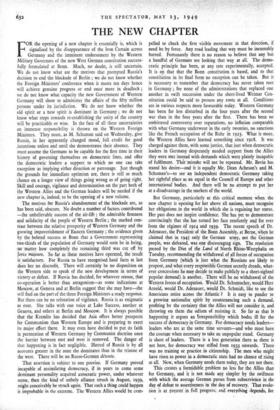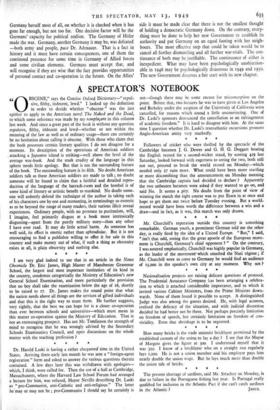THE NEW CHAPTER
FOR the opening of a new chapter it essentially is, which is signalised by the disappearance of the Iron Curtain across Germany and the imminent endorsement by the Western Military Governors of the new West German constitution success- fully formulated at Bonn. Much, no doubt, is still uncertain. We do not know what are the motives that prompted Russia's decision to end the blockade of Berlin ; we do not know whether the Foreign Ministers' conference when it meets ten days hence will achieve genuine progress or end once more in deadlock ; we do not know what capacity the new Government of Western Germany will show to administer the affairs of the fifty million . persons under its jurisdiction. We do not know whether the old spirit or a hew spirit is dominant in Germany ; we do not know what steps towards re-establishing the unity of the country will be practicable or wise. In the face of all these uncertainties an immense responsibility is thrown on the Western Foreign Ministers. They must, as M. Schuman said on Wednesday, give Russia, in her apparently changed mood, . full credit for good intentions unless and until she demonstratei their absence. They must assume the Germans to be capable for the first time in their history of governing themselves on democratic lines, and offer the democratic leaders a support to which no one can take exception as implying either direction or patronage. Just though the grounds for immediate optimism are, there is still as much 'chance on a longer view of things going wrong as of going right. ' Skill and courage, vigilance and determination on the part both of the Western Allies and the German leaders will be needed if the new chapter is, indeed, to be the opening of a new volume.
• The motives fur Russia's abandonment of the blockade are, as has been said, obscure. No doubt a number of factors contributed —the unbelievable success of the air-lift ; the admirable firmness and solidarity of the people of Western Berlin ; the marked con- trast between the relative prosperity of Western Germany and the growing impoverishment of Eastern Germany ; the evidence given by the belated success at Bonn that a Government representing two-thirds of the population of Germany would sodn be in being, - nci 'matter how" completely the remaining third was cut off by torie tnitieuie. So far is these motives haVe operated, the result IS satisfactory. For Russia to have recognised hard facts at last cit;es her no discredit, There will certainly, be no disposition On the Western side to speak of the new development in terms of Victory or defeat If Russia has decided, for whatever reason, that co-operation is better than antagonism—as some indications at Moscow, at Geneva and-at Berlin suggest that she may have—she will And on the part of the three Foreign Ministers a ready response. But there can be no relaxation of vigilance. Russia is as enigmatic as ever. She talks with one voice at Lake Success, another at Geneva, and others at Berlin. and Moscow. It is always possible that the Kremlin has decided that Asia offers better prospects for Communism than Western Europe and is preparing to exert Its major effort there. It may even have decided to put its faith En permeation of Western Germany by Communist doctrine once the barrier between east and west is removed. The danger of that happening is in fact negligible. Hatred of Russia is by all accounts greater in the zone she dominates than in the trizone of the west. There will be no Russo-German détente. .
That assertion is subject to one proviso. If Germany proved incapable of assimilating democracy, if in years to come some dominant personality acquired autocratic power, under whatever name, then the kind of unholy alliance struck in August, 1939, might conceivably be struck again. That such g thing could happen is improbable in the extreme. The Western Allies would be corn- pelled to check the first visible movement in that direction, if need be by force. Any road leading that way must be inexorably barred. Fortunately there is no reason to believe that any but a handful of Germans are looking that way at all. The demo- cratic principle has been, at any rate experimentally, accepted. It is on that that the Bonn constitution is based, and to that constitStion in its final form no exception can be taken. But it is necessary to remember that democracy has never taken root in Germany ; for none of the administrations that replaced one another in swift succession under the short-lived Weimar Con- stitution could be said to possess any roots at all Conditions are in various respects more favourable today. Western Germany has been far less disturbed in the four years after the second war than in the four years after the first. There has been no embittered controversy over reparations, no inflation comparable with what Germany underwent iii the early twenties, no sanctions like the French occupation of the 'Ruhr in 1943. What is more, the Western Allies have learned something since 1918. It was charged against them, with some justice, that just when democratic leaders in Germany desperately needed support from, the Allies they were met instead with. demands which were plainly, incapable of fulfilment. Thit'mistake will not be repeated. Mr. Bevin has stated his desire—and it is equally Mr. Dean Acheson's and M. Schuman's—to see an independent democratic Germany taking her rightful place as an equal in the Council of Europe and other international bodies. And there Will be no attempt to put her at a disadvantage in the markets of the World.
But Germany, particularly at this critical moment when the new chapter is opening for her above all nations, must recognise her obligations in the world in which she is regaining her status. Her past does not inspire 'confidence. She has yet to demonstrate convincingly that she has turned her face resolutely and for ever from the regimes of 1914 and 1939. The recent speech of Pr. Adeniuer, the President of the Bonn Assembly, at Berne, when he claimed that in 1945 only the German army,, not the German people, was defeated, was -one discouraging sign. The ,resolution passed by the Diet of the Land of North Rhine-Westphalia on Tuesday, recommending the withdrawal of all forces of occupation from Germany (Which is just what the Russians are likely to propose, and what every respiinSible Gentian secretly dreads, what- . .. . ever concessions he may decide to make publiclytO a short-sighted popular demand) is another. There will no withdrawal- of the Western forces of occupation. Would Dr. Schuniacher, would Herr Arnold, would Dr.. Adenauerovould Dr. Schmidt, like to see the Americans retire across the Atlantic ? it is easy to pander" to a growing nationalist spirit by countenancing such a demand, profiting by the certainty that the Allies will not consider it, and throwing on them- the odium of resisting it go far as that is happening it argues an Irresponsibility which bodes ill for the success of democracy in Germany. For democracy needs leaders— leaders who are at the same time servants—end who must have the courage when necessary to take an unpopular stand. Germany is short of leaders. There is a lost generation there as there is not here, for democracy was stifled from 1933 onwards. There was no training or practice in citizenship. The men whO might have risen ;to power in a democratic state had no chance of rising at all. Now, when Germany needs them today, they are not there.
This Creates a formidable problem no less for the Allies than for Germany, and it is not made any simpler by the swiftness with which the average German passes from subservience in the day of defeat to assertiveness in the day of recovery. That evolu- tion is at "'relent in full pingreSs, and everything depends, for Germany herself most of all, on whether it is checked when it has gone far enough, but not too far. One decisive factor will be the Germans' capacity for political realism. The Germany of Hitler made the war. Germany, another Germany it may be, was defeated —both army and people, pace Dr. Adenauer. That is a fact in history and it must have certain consequences, one of them the continued presence for some time in Germany of Allied forces and some civilian elements. Germans must accept that, and will recognise if they are wise that the fact provides opportunities of personal contact and co-operation in the future. On the Allies' side it must be made clear that there is not the smallest thought of holding a democratic Germany down. On the contrary, every- thing must be done to help her new Government to establish its authority and put Germany on an equal footing with her neigh- bours. The most effective step that could be taken would be to cancel all further dismantling and all further war-trials. The con- tinuance of both may be justifiable. The continuance of either is inexpedient. What may have been psychologically unobjection- able in 1946 may be psychologically disastrous in 1949 and 1950. The new Government deserves a fair start with its new chapter.







































 Previous page
Previous page